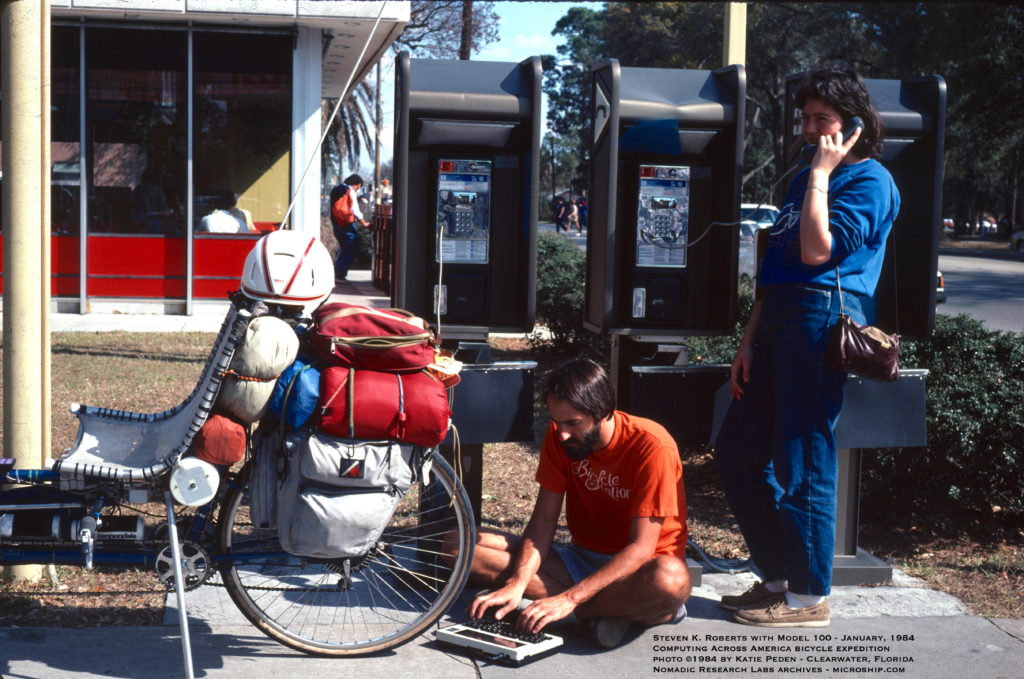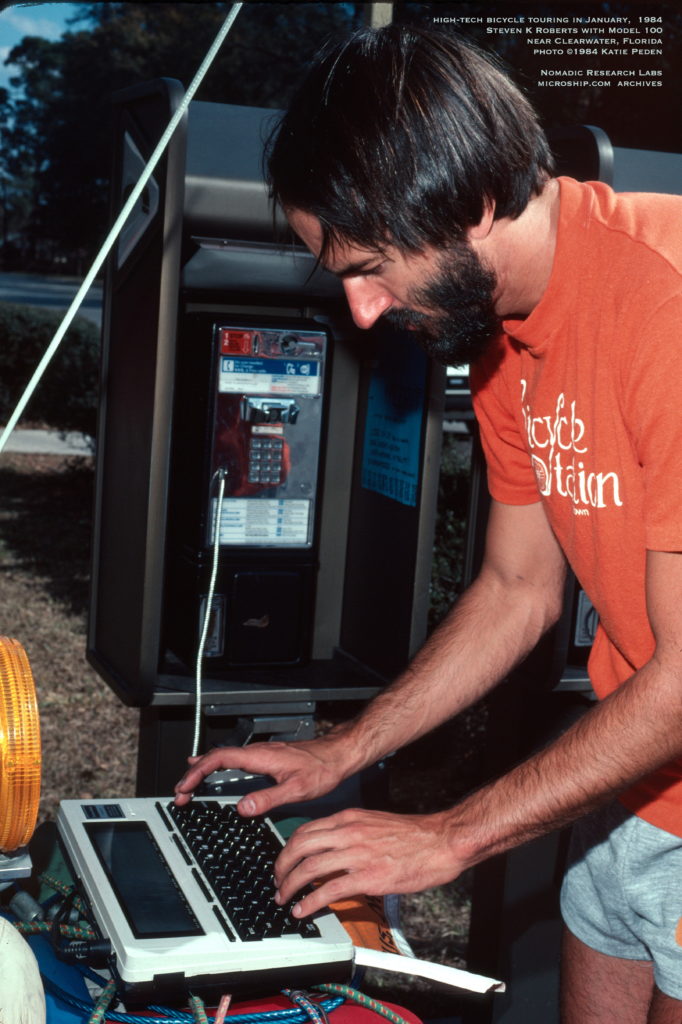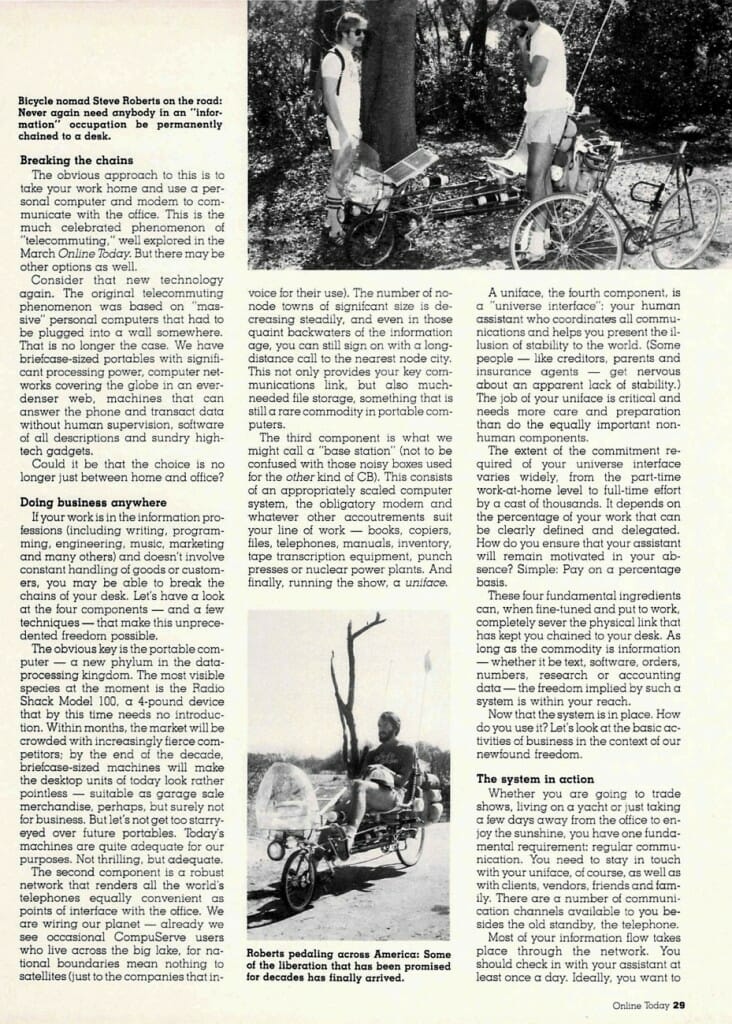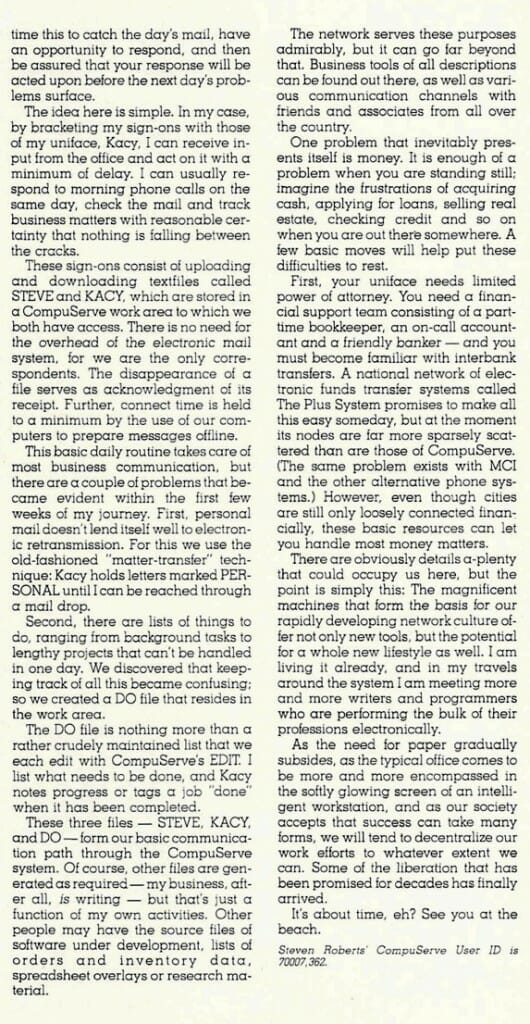
Work at Home? Work Anywhere! – Online Today
I wrote this article at a time of intense discovery… the crazy high-tech bicycle adventure was becoming a self-supporting enterprise, and the emerging toolset was hugely provocative. In 1984, there was much intense discussion about the viability of working at home via computers and network connections; this piece explored the notion that there was no reason to stop there. It has become a piece of telecommuting history.
After the rhapsodic opening, I discuss specific tools and techniques that allow you to sever the chains that bound you to your desk. (Naturally, decades later, some of those now sound quaint and/or obvious). This was one of my more focused pieces on this topic, and I remember getting lots of email in response… these were exciting and pivotal times.

by Steven K. Roberts
Online Today – May, 1984
As I pedal the planet on my “Computing Across America” bicycle odyssey, I encounter people, lots of people. Some regard me with a kind of envy: the reaction of the imprisoned to the free.
Some look me over with thinly veiled incredulity and then call my sanity into question: the reaction of the conservative to the renegade.
Others marvel at my survival and start talkin’ religion. “If you made it this far, my friend, you got Someone riding with you!”
Still others draw no clues from the high-tech accoutrements of my journey, for they see only a drifter, a wanderer, a bum. To them, I’m obviously a failure in life, reduced to pedaling around with all my possessions looking for dry places to sleep. Clearly not “successful.”
But what is success? Do you measure it in dollars? In acreage? In the size of your office or your position in a corporate hierarchy?
Or is success a bit less tangible than that? Job satisfaction, perhaps, or the sense of making a contribution to society? What about the simple joy of coming home to a hearth and family? Or the complex joy of untangling a convoluted web of interacting bugs, deftly changing a few lines of arcane code, and seeing your program run perfectly?
Unfortunately, the issue seems to become clouded by the expectations and norms of our society. A hitchhiker or wanderer is “not successful”; a computer store owner with a yacht is. A carpenter is just a common laborer; yet the VP of marketing at a profitable manufacturing enterprise is a “successful businessman.” This oversimplified perception is woven into the fabric of our culture, but it diverges further from the truth every day.
Bob Widlar, a legend of Silicon Valley, haunted Mexican beaches for years and lived like a “bum” while designing the world’s most advanced operational amplifier chips. Shel Silverstein, looking every bit the degenerate, sits in the murky shadows of a Key West bar and writes charming childrens’ stories. James Michener, with lifetime book royalties estimated at over $100 million, lives the rather spartan lifestyle of a Quaker.
The point is that it is possible to be wildly successful without a three-piece suit. And this is true today more than ever before.
In the last few years, there have been remarkable changes spawning global networks, portable computers, artificial intelligence and more. We’ve been hearing for years how all this would revolutionize our lives, but that revolution has been slow in coming — at least as it affects the average worker’s lifestyle. Although some 11 million people currently work at home, most are either self-employed or involved in sales.
But suddenly, almost startlingly, a new set of information tools is in place and working well. These are the tools that have made my trip possible, and they can be applied to a wide range of other business applications as well, from the hard-core nomadic professional to the traditional corporate executive who finds vacations and routine business travel unacceptably disruptive. They can be used by retirees pursuing a lifelong dream of wandering and by sales reps living out of the trunks of cars. Never again need anybody in an “information” occupation be permanently chained to a desk.
Breaking the chains
The obvious approach to this is to take your work home and use a personal computer and modem to communicate with the office. This is the much celebrated phenomenon of “telecommuting,” well explored in the March Online Today. But there may be other options as well.
Consider that new technology again. The original telecommuting phenomenon was based on “massive” personal computers that had to be plugged into a wall somewhere. That is no longer the case. We have briefcase-sized portables with significant processing power, computer networks covering the globe in an ever-denser web, machines that can answer the phone and transact data without human supervision, software of all descriptions and sundry high-tech gadgets.
Could it be that the choice is no longer just between home and office?
Doing business anywhere
If your work is in the information professions (including writing, programming, engineering, music, marketing and many others) and doesn’t involve constant handling of goods or customers, you may be able to break the chains of your desk. Let’s have a look at the four components — and a few techniques — that make this unprecedented freedom possible.
The obvious key is the portable computer — a new phylum in the data-processing kingdom. The most visible species at the moment is the Radio Shack Model 100, a 4-pound device that by this time needs no introduction. Within months, the market will be crowded with increasingly fierce competitors; by the end of the decade, briefcase-sized machines will make the desktop units of today look rather pointless — suitable as garage sale merchandise, perhaps, but surely not for business. But let’s not get too starry-eyed over future portables. Today’s machines are quite adequate for our purposes. Not thrilling, but adequate.
The second component is a robust network that renders all the world’s telephones equally convenient as points of interface with the office. We are wiring our planet — already we see occasional CompuServe users who live across the big lake, for national boundaries mean nothing to satellites (just to the companies that invoice for their use). The number of no-node towns of significant size is decreasing steadily, and even in those quaint backwaters of the information age, you can still sign on with a long-distance call to the nearest node city. This not only provides your key communications link, but also much-needed file storage, something that is still a rare commodity in portable computers.
The third component is what we might call a “base station” (not to be confused with those noisy boxes used for the other kind of CB). This consists of an appropriately scaled computer system, the obligatory modem and whatever other accoutrements suit your line of work — books, copiers, files, telephones, manuals, inventory, tape transcription equipment, punch presses or nuclear power plants. And finally, running the show, a uniface.
A uniface, the fourth component, is a “universe interface”: your human assistant who coordinates all communications and helps you present the illusion of stability to the world. (Some people — like creditors, parents and insurance agents — get nervous about an apparent lack of stability.) The job of your uniface is critical and needs more care and preparation than do the equally important non-human components.
The extent of the commitment required of your universe interface varies widely, from the part-time work-at-home level to full-time effort by a cast of thousands. It depends on the percentage of your work that can be clearly defined and delegated. How do you ensure that your assistant will remain motivated in your absence? Simple: Pay on a percentage basis.
These four fundamental ingredients can, when fine-tuned and put to work, completely sever the physical link that has kept you chained to your desk. As long as the commodity is information — whether it be text, software, orders, numbers, research or accounting data — the freedom implied by such a system is within your reach.
Now that the system is in place, how do you use it? Let’s look at the basic activities of business in the context of our newfound freedom.

The system in action
Whether you are going to trade shows, living on a yacht or just taking a few days away from the office to enjoy the sunshine, you have one fundamental requirement: regular communication. You need to stay in touch with your uniface, of course, as well as with clients, vendors, friends and family. There are a number of communication channels available to you besides the old standby, the telephone.
Most of your information flow takes place through the network. You should check in with your assistant at least once a day. Ideally, you want to time this to catch the day’s mail, have an opportunity to respond, and then be assured that your response will be acted upon before the next day’s problems surface.
The idea here is simple. In my case, by bracketing my sign-ons with those of my uniface, Kacy, I can receive input from the office and act on it with a minimum of delay. I can usually respond to morning phone calls on the same day, check the mail and track business matters with reasonable certainty that nothing is falling between the cracks.
These sign-ons consist of uploading and downloading textfiles called STEVE and KACY, which are stored in a CompuServe work area to which we both have access. There is no need for the overhead of the electronic mail system, for we are the only correspondents. The disappearance of a file serves as acknowledgment of its receipt. Further, connect time is held to a minimum by the use of our computers to prepare messages offline.
This basic daily routine takes care of most business communication, but there are a couple of problems that became evident within the first few weeks of my journey. First, personal mail doesn’t lend itself well to electronic retransmission. For this we use the old-fashioned “matter-transfer” technique: Kacy holds letters marked PERSONAL until I can be reached through a mail drop.
Second, there are lists of things to do, ranging from background tasks to lengthy projects that can’t be handled in one day. We discovered that keeping track of all this became confusing; so we created a DO file that resides in the work area.
The DO file is nothing more than a rather crudely maintained list that we each edit with CompuServe’s EDIT. I list what needs to be done, and Kacy notes progress or tags a job “done” when it has been completed.
These three files — STEVE, KACY, and DO — form our basic communication path through the CompuServe system. Of course, other files are generated as required — my business, after all, is writing — but that’s just a function of my own activities. Other people may have the source files of software under development, lists of orders and inventory data, spreadsheet overlays or research material.
The network serves these purposes admirably, but it can go far beyond that. Business tools of all descriptions can be found out there, as well as various communication channels with friends and associates from all over the country.
One problem that inevitably presents itself is money. It is enough of a problem when you are standing still; imagine the frustrations of acquiring cash, applying for loans, selling real estate, checking credit and so on when you are out there somewhere. A few basic moves will help put these difficulties to rest.
First, your uniface needs limited power of attorney. You need a financial support team consisting of a part-time bookkeeper, an on-call accountant and a friendly banker — and you must become familiar with interbank transfers. A national network of electronic funds transfer systems called The Plus System promises to make all this easy someday, but at the moment its nodes are far more sparsely scattered than are those of CompuServe. (The same problem exists with MCI and the other alternative phone systems.) However, even though cities are still only loosely connected financially, these basic resources can let you handle most money matters.
There are obviously details a-plenty that could occupy us here, but the point is simply this: The magnificent machines that form the basis for our rapidly developing network culture offer not only new tools, but the potential for a whole new lifestyle as well. I am living it already, and in my travels around the system I am meeting more and more writers and programmers who are performing the bulk of their professions electronically.
As the need for paper gradually subsides, as the typical office comes to be more and more encompassed in the softly glowing screen of an intelligent workstation, and as our society accepts that success can take many forms, we will tend to decentralize our work efforts to whatever extent we can. Some of the liberation that has been promised for decades has finally arrived.
It’s about time, eh? See you at the beach.





You must be logged in to post a comment.